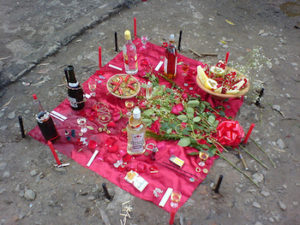
This date from 1550 celebrates the Macumba/Candomble religion, one of many African-based faiths practiced in the Americas.
Macumba is the "umbrella" term for two principal forms of African spirit worship: Candomble and Umbanda. It is the Brazilian equivalent of Voudon and Santeria. Although macumba is connected with black magic, a more suitable term is Quimbanda. When the Portuguese began shipping Black slaves to Brazil in the 16th century, the country already had a mixture of religions. Catholicism was desperately trying to rid the area of the native Indian beliefs. The slaves found their beliefs in spirits and magic synonymous with their native faiths. The two blended; while the slaves, on the surface, worshipped under the Catholic faith, they secretly carried on their religious beliefs until their liberation in 1888.
At least 18 generations of slaves had grown up with a belief in the Orishas. Candomble resembled Yoruban African religions. The name comes from the celebration held on coffee plantations by the Blacks. The first community for Candomble was in Salvador, the old capital city of Brazil. The religion's spiritual leaders are women or high priestesses. Initially, the men held these roles, but as slaves, they had to spend their days in the field. Umbanda derives from the Hindu aum-gandha, meaning "divine principle." It gathers its beliefs about spirits and spiritual healing from African religions, Hinduism, and Buddhism. Umbandistas also communicate with Catholic saints but through intermediaries (ancestors).
Publicly, Umbanda (Macumba) began in 1904. Black magic, or Quimbanda, came with the slave ships and is still used today. Much of the teachings are still oral. Negative sentiments are typically implied when the concepts "cult" and "sect" are used in popular conversation. Both groups call upon the god Exus to protect their temples. Priests are called babalao and handle animals that will be used as sacrifices in rituals. For members, thorough devotion to ritualistic chants and dancing is required for initiation into the group.
Abstinence from particular food and sex is also required. Umbandistas, like other Macumba groups, believe that there are no "evil" spirits, only careless spirits that need to be educated. Quimbanda, however, uses this mischief for its desires. Although many consider Quimbandistas black magic, They draw power from unruly spirits, and their practices are considered tainted. Again, millions publicly practice Catholicism but privately worship the Orishas.
Every year, on January 1, a celebration for the orisha Yemanji, "water goddess," takes place in Brazil. Most events are filmed and broadcast in Rio de Janeiro, but the festival occurs in almost every community nationwide. Over one million celebrants dress in white and enter the ocean at dusk. High priestesses initiate new members into the priesthood. Members sail little boats filled with religious artifacts (including statues of saints) into the surf. Even if the ships sink, the orisha Yemanji (linked with the Virgin Mary of the Catholic faith) has heard the prayers of devotees and will continue her support for another year.
"Accounting for Recent Anti-Syncretist Trends in Candomble-Catholic Relations"
By Peter B. Clarke
copyright 1998, Greenwood Press.
New Trends and Developments in African Religions. Westport, CT: